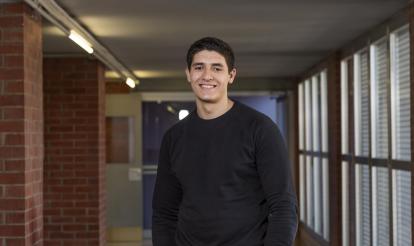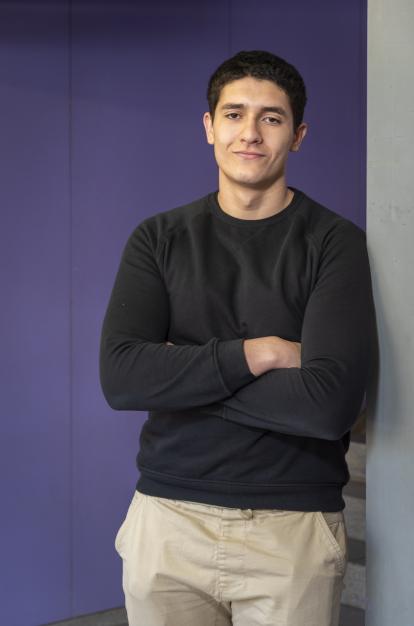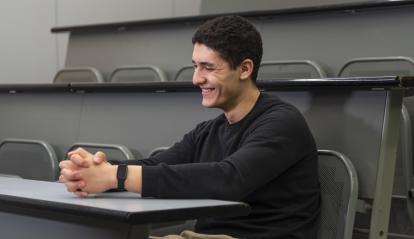
You are reading:

You are reading:

16.10.25
6 minutes readWith his way of speaking, Mohamed Dari (Vic, 2004) conveys a maturity that does not seem appropriate for his age. The same maturity he has applied to his academic career, especially when the scarcity of financial resources has not made it easy for him. He explains his story in a classroom at the Faculty of Computer Science at the Universitat Politècnica de Catalunya, where he is currently studying Informatics Engineering thanks to a bachelor fellowship from the ”la Caixa” Foundation, which helps excellent students with limited financial resources.
Mohamed speaks fondly of his family, especially his father, who came to Spain from Morocco in search of opportunity. He and his wife settled in Vic, where they had five children, of whom Mohamed is the eldest. “He worked in construction, which is a very hard job, for 15 years,” he explains. “Whenever I didn’t feel like studying, I would think of my father and how hard he worked every day. He taught me from a very young age that you have to work hard to achieve things, so that the family can be all right,” he recalls. “He has no education, he can’t read or write, but it’s really good that he’s helped me so much in life. You don’t have to go to university to teach something important. Many lessons are not academic but personal.”

In his early years at school, Mohamed’s parents encouraged him to study, but never pressured him to get good results. “During primary school, we didn’t even check the grades because we didn’t know how to access the platform where they were posted,” he explains casually. One day, while playing football in the park, his mother asked a friend if she could check his second-year results. “They didn’t tell me what I’d got,” he remembers, but they assured him that she had nothing to worry about because he seemed to be doing well.

Mohamed has good memories of his school, where he soon showed that he had a talent for learning: “I paid attention in class, did my homework and got good marks in exams because I remembered everything. The teachers said I was good at it.” Paradoxically, his parents’ lack of education reinforced his autonomy because, unlike his classmates, he had no one at home to help him with his homework.
When he finished compulsory education (ESO), the move to upper secondary education (bachillerato) was a turning point for Mohamed, a crossroads that made him mature. It’s a non-compulsory level of education and was more expensive at the state-subsidised private school he attended. He had already assumed that his family would not be able to afford it and began to think about some kind of vocational training course, which would at least allow him to work. But the teachers at his school asked him to stay on because they thought his results were very good and he needed to make the most of them. After receiving a grant from the Ministry of Education to cover the cost of those two years, he made a decision: “If I only dedicate myself to studying, I have to do it well and not waste this opportunity.”
Mohamed vividly remembers his first baccalaureate exam, in business studies: “I wanted a 10, I really wanted it, I wanted the highest mark.” And he got it. From then on, he did the same in every exam. He was not capable of studying just to pass, he had to give his best. This demand was not aimed at a specific goal, because he didn’t know what he wanted to study if he went to university. It was simply a personal challenge: to do his best in every exam.
Impressed by Mohamed’s grades, his friends urged him to find out about grants to go to university. One afternoon, while searching for information on the Internet, he came across the ”la Caixa” Foundation’s fellowships for undergraduates and was impressed by what they had to offer. He knew it would be difficult to get one, but he applied. Now in his second year of the fellowship, he has no regrets: “I’m very grateful, because it provides me with resources that are not just financial. Fellowship holders also have the opportunity to take English classes and we have a counsellor who we talk to every two weeks about academic issues, but also about how we’re doing emotionally. We’re supported on this journey, and I really appreciate that.”
With the support of the fellowship, he completed the first year of Philosophy, Politics and Economics, but was not convinced and is now studying for a degree in Computer Engineering and is happy with the change, not only because of the job prospects: “Here, I’ve met magnificent people, very good, intelligent and hard-working, people from whom you learn a lot. It’s given me so much, and not just academically.”
Looking back, Mohamed believes he would have dropped out of school if he had not received the fellowship. Although he doesn’t like to think about it, he has a vision of what he might be doing in the coming years. For now, he wants to continue studying in a field related to computing, such as data science or cybersecurity. But his dream is to build something from scratch on his own, such as an app or a web service: “It’s a personal challenge, to create something useful for society through programming,” he explains enthusiastically. “It’s something I can see myself doing.”
For now, Mohamed’s drive has already had an impact on those around him. His siblings have taken him as a source of inspiration and are devoting more time to their education. Mohamed helps them as much as he can and is clear about the advice he would give them and other young people in a similar situation to his own: “I would tell them to put a lot of effort into their studies, because they don’t know the rewards they can have in the long run,” he says with conviction. “Study, and the rewards will come.”

Applications for the 2024 call for bachelor fellowships are open until 31 May. These fellowships include 600 euros per month for the duration of the fellowship, an initial one-off payment of 600 euros for computer equipment and materials, enrolment fees, additional support for international stays, English language courses, a personal academic counselling programme and training in transversal skills.
Students in the final year of their baccalaureate or higher-level of vocational training who are beneficiaries of the fixed allowance for income of the general scholarship of the Ministry of Education, Vocational Training and Sport or of the Basque government can apply for this fellowship.